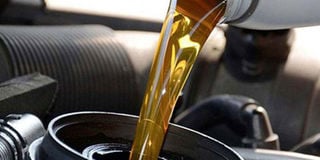How to detect counterfeit engine oil

Engine oil
What you need to know:
Hello Paul, I sometimes buy affordable engine oil from spareparts shops in Wandegeya. How can I know that the oil they are selling is not counterfeit? What is the effect of using counterfeit oil on my engine? Deo
Hello Paul, I sometimes buy affordable engine oil from spareparts shops in Wandegeya. How can I know that the oil they are selling is not counterfeit? What is the effect of using counterfeit oil on my engine? Deo
Hello Deo, fake or counterfeit engine oil is manufactured to look like genuine oil but does not have the protective and performance enhancing attributes. Counterfeit or fake engine oil is either recycled old engine oil or low grade oil passed off as high grade. Counterfeiters have invested more money in duplicating packaging than the contents of their product, so it is rare for one to be able to identify counterfeit engine oil by observing the poor quality packaging and sealing.
To the casual observer, the counterfeit engine oil will look as clean as the new genuine one. It would take a laboratory analysis and tests to determine counterfeit oil. Therefore, you should consider buying engine oil from an appointed or authorised dealer of the oil brand in question.
Genuine car engine oil is produced by an expensive fractional distillation process before it is blended with additives to protect and improve your engine performance. Good engine oil prevents frictional damage and seizure between fast moving metallic parts, cools the engine by carrying heat away from hot moving parts, cleans sludge, inhibits corrosion, improves sealing and remains in suspension over the drain interval.
Fake engine oil does not provide the above functions. Use of fake or counterfeit engine oil results in engine damage from overheating, warping or frictional metal wear or seizure. Oil sludge develops and blocks oil passages which will not only lead to poor engine performance but possibly catastrophic damage such as engine knocking due to damage of fast moving engine parts.
Which is better between a Corolla Fielder and Subaru Forester?
Hello Paul, I want to buy a fuel efficient and reasonably comfortable estate wagon car and would like to choose between the 2003 Toyota Corolla Fielder and the 2003 Subaru Forester. My previous car was a Toyota Probox 1.3 litre. Kigongo
Hello Kigongo, the Toyota Corolla Probox 1.3 litre is probably one of the most fuel efficient (Highway fuel economy: 18km per litre) small estate wagon car on our used car market. But as you probably know, the Probox design and features are more utilitarian (work-related) than comfortable (boxy shape, pick up like rear leaf springs and basic seats). The 2003 Toyota Corolla Fielder is a better choice compared to the Subaru because it has two small engines; the 1.5 litre (Highway fuel economy: 15 km/litre) and the 1.8 litre engine which gives you about 13.5 km/litre.
Forester’s smallest 2.0 litre engine is less fuel efficient (Highway fuel economy: 12 km/Litre). If you are looking to upgrade because of the need for better passenger comfort and convenience, the Fielder will meet your needs. Subaru Forester is more on the playful (performance or handling) and adventurous side of life than on the working side (all wheel drive for off road).
Why has my battery failed to start?
Hello Paul, I own a VW Golf 4. For three weeks now, I have to jump start it every morning. Our family mechanic has replaced the battery and alternator but the problem persists. Can you help? Annette
Hello Annette, it can be very upsetting when your car battery fails to start in the morning when you are late for work or for a school run. The battery on your car helps to start the ignition system which burns fuel and turns your engine. When the engine is running, it turns the alternator which generates electricity to recharge the battery as well as power consumers such as lights, radio, air conditioning and other convenient electrical features. Whereas a bad battery (old or poorly maintained) and a damaged alternator are usually the primary suspects when the battery fails to start, there are other factors that can cause this situation.
These include parasitic drain of the battery due to faulty wiring, damaged control modules or poor installation of accessories such as radio amplifiers and car security devices. These drain the battery because they exceed the small energy demand of the factory fitted clock, immobiliser and radio presets. Occasionally, faulty door switches, radios or accessories that do not power down when you switch off ignition will also drain your battery. A faulty car charging system can prevent complete charging of the battery. There is need to check the alternator drive belt tension as well as pulley.
Check the alternator circuit and battery terminals for loose connections or corrosion damage, wrong battery capacity and frequent short drives. The car manufacturer recommends a battery capacity depending on the accessories and required cold crank amperage to help start the car when the engine is cold. If a battery is small it will not hold enough charge for cold cranking. Frequent short battery charges do not allow the car battery to be fully charged. Also, prolonged parking of the car can lead to permanent damage of the battery.




